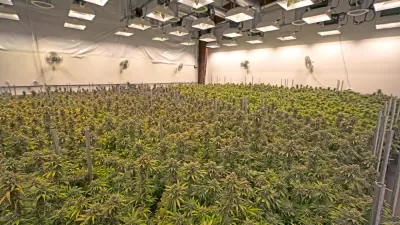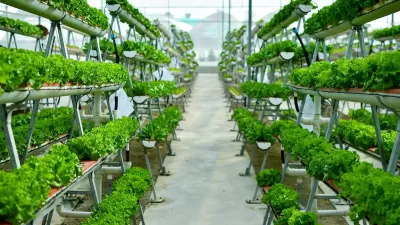After Washington legalized marijuana in 2012, an indoor cultivation industry has grown to a sizable presence in the state's environmental footprint.

John Stang reports on the surprisingly large environmental footprint of the nascent indoor marijuana cultivation industry in the state of Washington.
A new report by the Northwest High Intensity Drug Trafficking Area—the second if its kind since the state legalized recreational marijuana sales in 2012—presents a somewhat surprising portrait of marijuana cultivation, both legal and illegal, around the state.
"Marijuana growers and processors use 1.63 percent of the state’s electricity," writes Stang, which is enough electricity to power 2 million homes. "The carbon footprint, according to the report, equals that of about 3 million cars," adds Stang. There are more environmental impacts of the industry, such as the huge amount of water being siphoned off for grow operations and the encroachment of illegal grow sites on state-owned public lands.
Stang also shares some of the public health safety statistics included in the report.
FULL STORY: Washington’s pot industry isn’t as green as you’d think

Alabama: Trump Terminates Settlements for Black Communities Harmed By Raw Sewage
Trump deemed the landmark civil rights agreement “illegal DEI and environmental justice policy.”

Planetizen Federal Action Tracker
A weekly monitor of how Trump’s orders and actions are impacting planners and planning in America.

The 120 Year Old Tiny Home Villages That Sheltered San Francisco’s Earthquake Refugees
More than a century ago, San Francisco mobilized to house thousands of residents displaced by the 1906 earthquake. Could their strategy offer a model for the present?

High-Speed Rail Tracker
Smart Cities Dive follows high-speed rail developments around the country

Ken Jennings Launches Transit Web Series
The Jeopardy champ wants you to ride public transit.

BLM To Rescind Public Lands Rule
The change will downgrade conservation, once again putting federal land at risk for mining and other extractive uses.
Urban Design for Planners 1: Software Tools
This six-course series explores essential urban design concepts using open source software and equips planners with the tools they need to participate fully in the urban design process.
Planning for Universal Design
Learn the tools for implementing Universal Design in planning regulations.
Clanton & Associates, Inc.
Jessamine County Fiscal Court
Institute for Housing and Urban Development Studies (IHS)
City of Grandview
Harvard GSD Executive Education
Toledo-Lucas County Plan Commissions
Salt Lake City
NYU Wagner Graduate School of Public Service





























